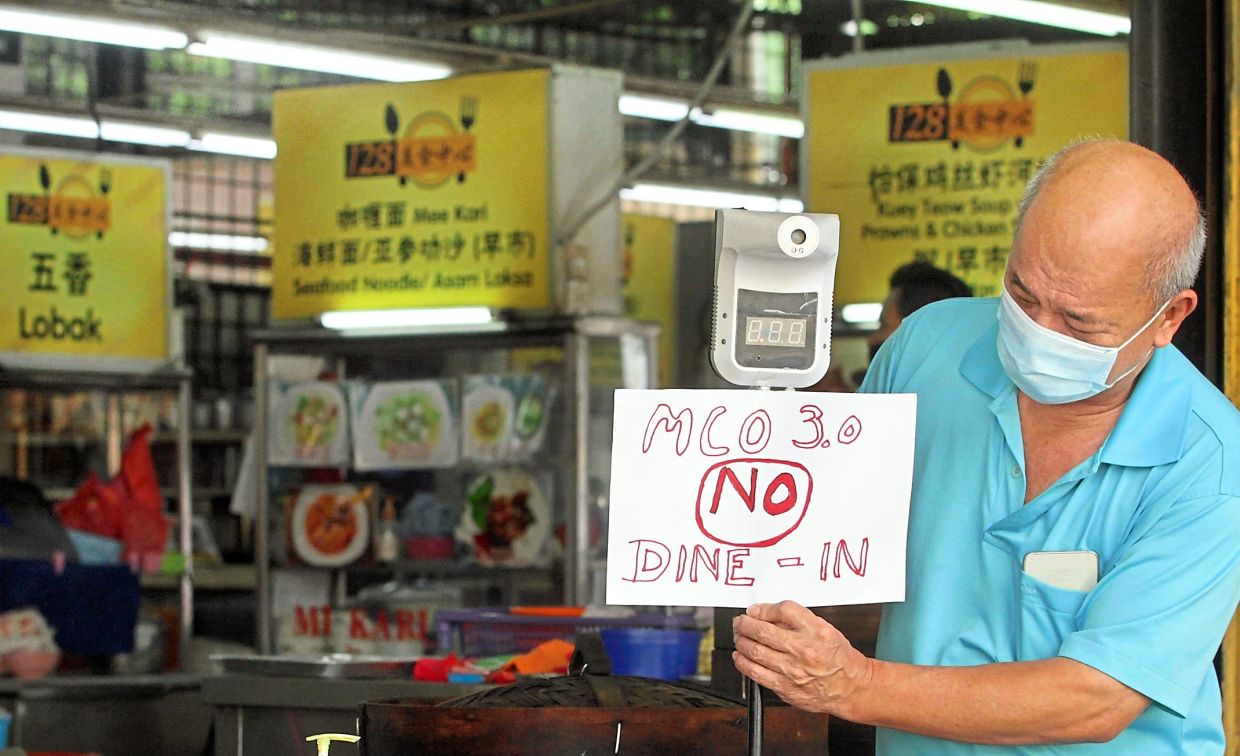
Tapau only: Under MCO 3.0, dining-in at retaurants and food courts are not allowed. — KK SHAM/The Star
IN the past week, I was invited to two government agency media dinners and meetings with two corporate figures who insisted on physical sessions.
It was just ridiculous. While I’m grateful for the thought, I had to politely decline the offers.
These meals and meetings were inconsequential. Nothing could change even if they were cancelled.
So, it was a relief when the movement control order encompassing the entire Kuala Lumpur, parts of Johor, Perak, Kedah and Terengganu was enforced from May 6 to 17.
Many of us would have preferred a much tougher measure, like the first MCO in March last year, to counter the raging Covid-19 pandemic.
The MCO 3.0 seems like a questionable measure, and it hasn’t helped assure Malaysians when our ministers make conflicting statements.
They’re at sixes and sevens, with just no coordination. What’s going on here? Come on!
By now, after a year, we would expect announcements to come with details and guidelines, but instead, we had to wait for the following day to learn how business activities would be affected.
The newsrooms of most media were flooded with enquiries from people wanting to know more.
Curiously, why should the MCO in states be made separately?
The MCO won’t get the red carpet from the business sector, particularly when it’s just finding its feet again from the last round. But this round for a clampdown is grossly overdue.
The uncontrolled crowds at some Ramadan bazaars – which were subsequently closed in many parts of KL, and elsewhere – were a recipe for disaster. The management of these bazaars certainly failed to do their jobs and must be held accountable.
The traders, including many from the low-income group and even those who lost their jobs, were only trying to make a decent living in these tough times.
But it doesn’t help that the crowds that thronged some of these crowded bazaars violated SOP, and the pictures, if they’re real, show plenty of potential for body contact.
Where were the Rela and City Hall officials meant to man the exit points?
The truth is, we have all let our guard down. As the government relaxed the rules, many of us returned to normalcy thinking the pandemic has been kept at bay.
Instead, the figures shot up, and even more disconcerting, our public hospitals have run out of beds for Covid-19 patients.
Until last week, at least, I find that many Malaysians are not taking the pandemic seriously despite the spike in the number of infections.
For whatever reason, we’re still insisting on unnecessary physical contact. I’m bewildered at all the whining because of a stricter lockdown.
When the number of positive cases shot up previously, some complained that they were inflated for “political reasons”.
With the jump this time around, some have, instead, questioned if these figures had been downplayed, and queried if the media has been ordered to tone down the issue.
But our patience is wearing thin. Our poor frontliners have been fatigued all this while because they’ve been working non-stop since last year. And still, the numbers are not coming down.
There have been so many different orders that we’ve lost count of the acronyms.
I had a close call recently. Some media friends had a buka puasa do with Communications and Multimedia Minister Datuk Saifuddin Abdullah.
I have traditionally hosted it, and those in the group have had such gatherings for years with Saifuddin, too, who has been involved in the moderation movement with other like-minded people.
Saifuddin was the chief executive officer of the Global Movement of Moderates in 2013 and I, a trustee of the government-formed foundation, have spent much time engaging with youth in promoting interracial and religious harmony.
Over nasi kandar, we asked Saifuddin why he had yet to be vaccinated like other ministers and Members of Parliament.
His reply was that he was waiting to do it together with journalists, who have been pushing for priority as frontliners.
He must have regretted his noble intention because he was found to be positive a few days later, the dreaded news coming to us via his ministry.
We all rushed to be tested, and unfortunately for one guest, he was snagged by the virus. While the prominent moderation advocate was found to be asymptomatic, he was hospitalised as he’s elderly.
Saifuddin is recovering and still texting and updating us on his condition. We pray for his and his wife’s speedy recovery at the Sungai Buloh hospital.
In Saifuddin’s case, he was infected by a staff member at his ministry, which reveals how it can be passed around so easily.
Kudos must go to Selangor Mentri Besar Datuk Seri Amiruddin Shari, who had the political will to recommend for the MCO in six districts in the state, and for ceasing the Ramadan bazaar.
We can surely expect a backlash, but he has done the right thing. It’s a warped argument for those who want the bazaars to continue because factories and bazaars can’t be compared.
Data doesn’t lie. The infections in factories have dropped with the situation contained, but the spread has been at the bazaars.
In any case, they have operated for more than 25 days, and this is the final week of the fasting period.
Amiruddin has clearly placed the safety and health of the people above personal and political popularity, unlike other politicians.
We all know we can be exposed at the Ramadan bazaars or at meetings, but we never imagine getting infected by our family members, colleagues or close friends at meals.
It’s time to be reminded to jangan ke sini, ke sana again. Let MCO 3.0 be stringent, like a real one with no flip flop decisions or flexibility. And then, we can stop singing that lockdown blues.





